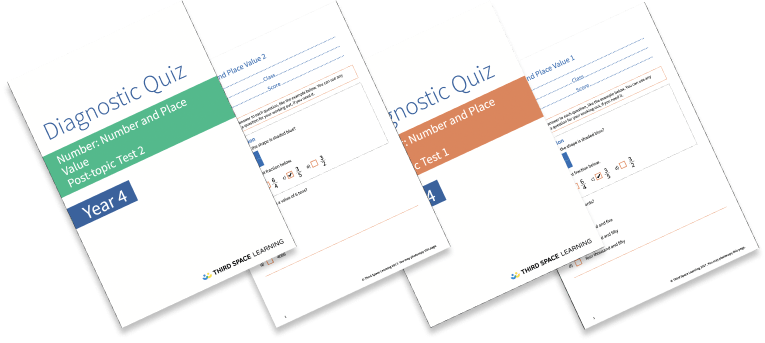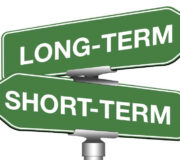The Successes And Challenges Of Developing Accurate Diagnostic Assessment To Inform Next Steps in Teaching
Diagnostic assessment is a key tool in KS2 maths teaching, but one that can be difficult to know how to do effectively. In this blog, primary school teacher and Head of Academic Standards here at Third Space Learning Candida Crawford shares her insights on how to make it work best for you.
Assessment has always been crucial to teaching maths. The time we spend teaching pupils needs to be as effective as possible – especially this year when many pupils will be further behind than usual having missed up to four months of their usual in-class teaching.
Teachers need to know their gaps, teach to those gaps, and then check that pupils have retained their knowledge. Getting to grips with a new class’ existing knowledge (without spending forever testing them) can be tricky at the best of times, let alone when gaps are greater and more diverse than usual this year.
As KS2 maths intervention providers, we spend hours each week with thousands of KS2 pupils. In that time, we have to know what progress each pupil has made in order to determine what is taught in the following week, and to make sure that our wonderful schools who trust us with their pupils have total insight into how their money is being spent, and for what impact.
Over the years, we’ve learnt how to strike a balance between assessing thoroughly enough that we understand pupils’ gaps, and being light-touch enough that it doesn’t eat into crucial learning time.
Number and Place Value Pre and Post Diagnostic Assessment Pack
A FREE downloadable resource to diagnose number and place value learning gaps for your Year 3, 4, 5, and 6 pupils.
Download Free Now!Here’s what we’ve learnt about how to meaningfully assess primary maths pupils, without spending too much time testing.
Assess KS2 gaps early: initial diagnostic assessment
First up, we always assess pupils at the start of their time with us. “Mission Zero”, our interactive online assessment that all pupils sit before their first session, is a key part of all our programmes, and it has two main purposes.
First, to inform the personalised programme of lessons for each pupil; and, second, together with post-session and end-of-programme assessment, it helps to measure the impact of the lessons on individual pupils.
We ask pupils two types of questions on each topic: calculation problems and worded problems.
These help us see whether a pupil needs to spend time learning a procedure or concept or, if they are able to use it, whether they can apply it to a problem.
From this, we can see how they’re doing in each area:
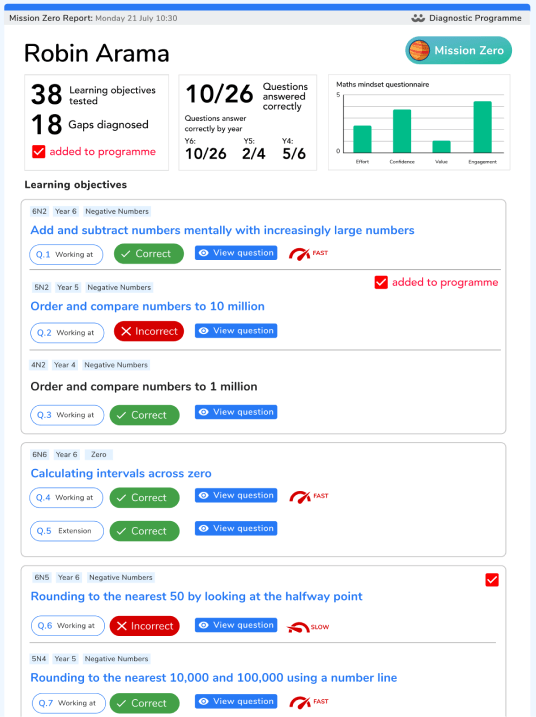
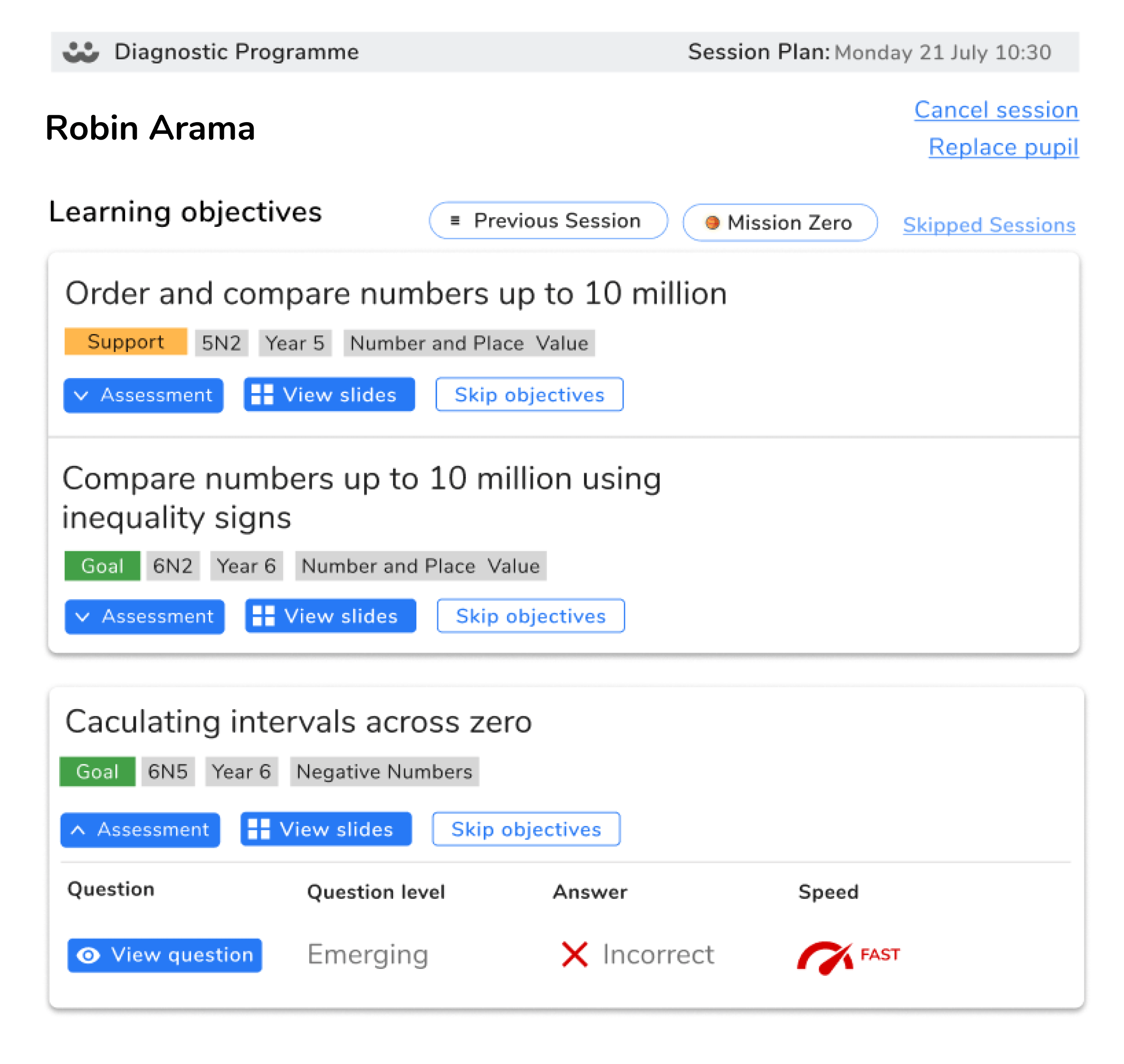
Each question we ask in Mission Zero relates to a single Learning Objective, mapped to each of the 500+ Learning Objectives in our online intervention curriculum.
Our detailed assessment maps can then pinpoint exactly where pupils need the most support and diagnose the right sequence of Learning Objectives to plug individual gaps and address misconceptions.
In your school: Like many you may be unwilling (or indeed find it unnecessary) to do a pre-test at the start of every term, but we would strongly recommend it for at least the start of the year.
This helps track real progress, as it provides a comparative baseline assessment based on a pupil’s position as they’ve returned to school after the long summer holidays.
Thousands of diagnostic maths questions available
For schools signed up for our online one to one intervention programmes, we have written thousands and thousands of questions to be used for assessment, all carefully aligned to the curriculum and the appropriate year group.
We use a multiple choice format, and for each question we’ve created one correct answer and three distractors.
A word on distractors. In our experience these are highly important; they’re not just random wrong answers but are designed to be an answer a pupil could potentially get to based on a specific misconception.
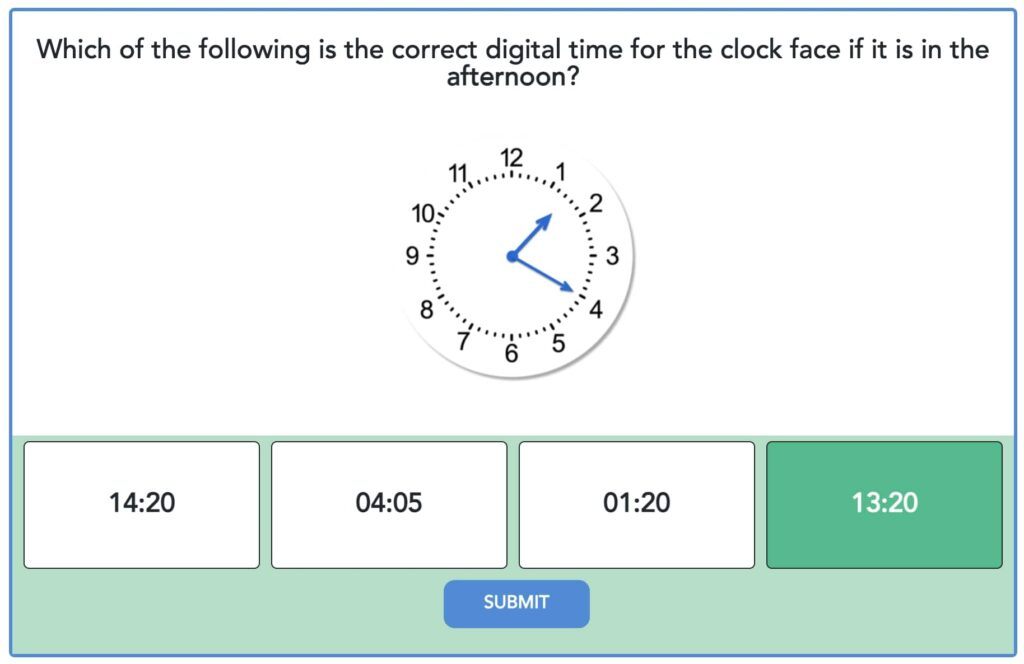
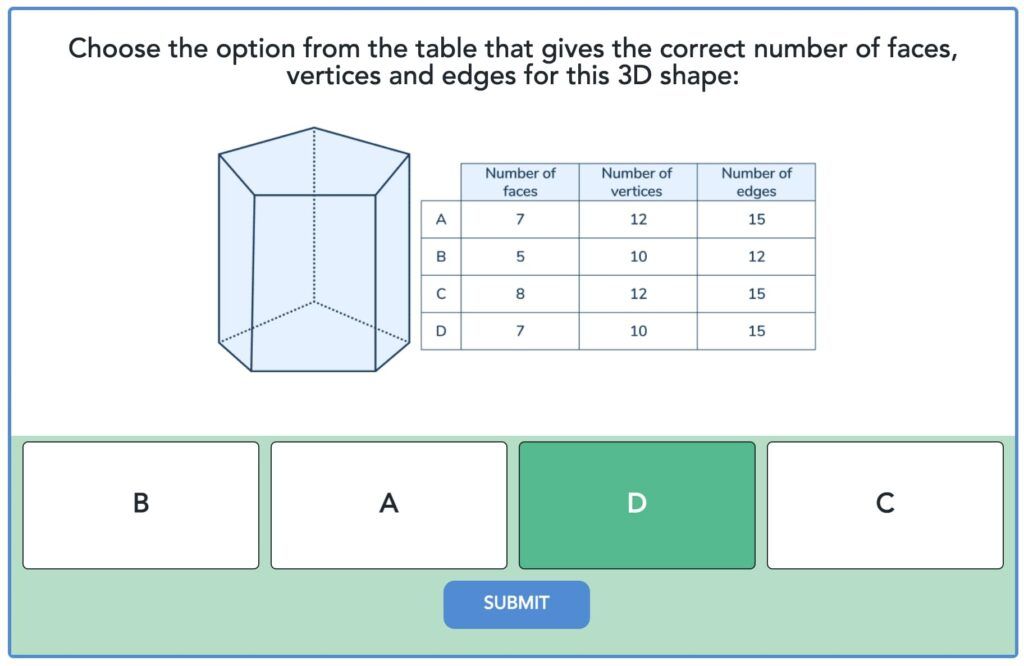
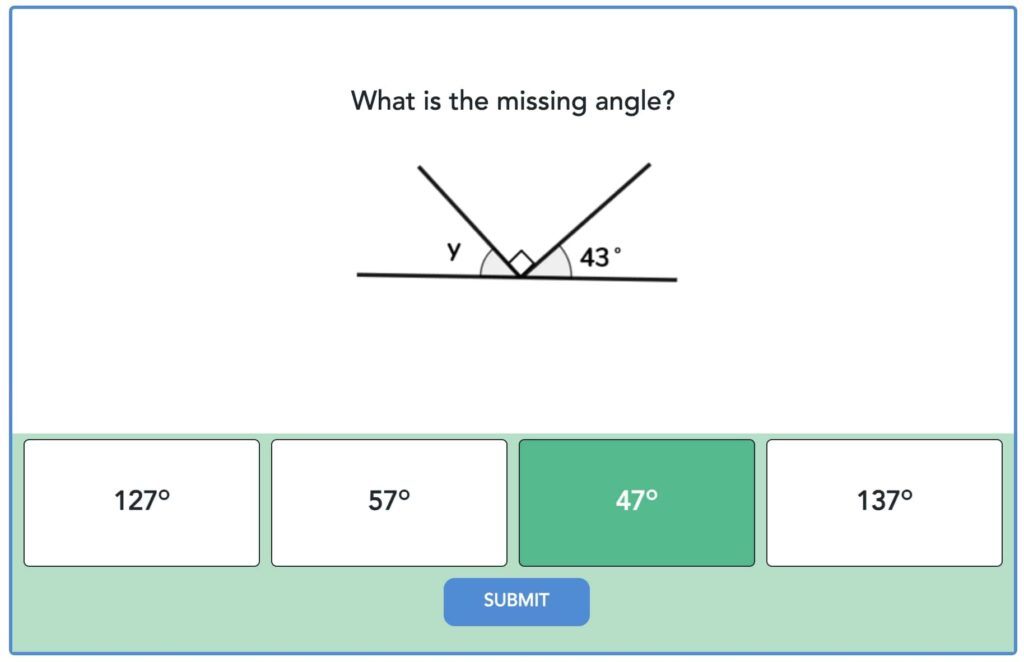
In your school: When you conduct your own diagnostic assessments at school, make sure that any tool or questions you use include distractors, so you know why a pupil has made a mistake.
On our platform, all the pupils’ answers feed into a unique algorithm which helps to identify the most appropriate programme of lessons for each pupil.
For your teaching, we advise that you teach to the results you have found. This will save you time and help you target the areas that pupils need help with the most.
See also: Hinge questions
Where to find quality assessment materials for KS2
As well as the thousands of diagnostic questions on our platform, we have also created a series of free KS2 diagnostic quizzes on seven key topics: addition, subtraction, multiplication, division, fractions, decimals and percentages.
Each quiz contains multiple choice questions specifically created to identify precise misconceptions, and includes mark schemes to help plug gaps and inform planning.
– Year 6 Diagnostic Maths Quizzes
– Year 5 Diagnostic Maths Quizzes
Looking for even more diagnostic assessment resources? We’ve got a whole range of pre- and post-teach diagnostic assessments in our online resource library, The Third Space Maths Hub. Sign up for free today to download a selection completely free, or access the entire range with whole school resources.
Low stakes, frequent testing is key to great assessment
In all of our intervention programmes, the initial baseline test is topped up with assessment throughout the term.
This comes in the form of a couple of questions after a student’s one to one lesson each week. The answers to the Post-Session Questions help to continuously diagnose gaps and our tutors will always use a question the pupil got wrong in the previous week to start off the next lesson.
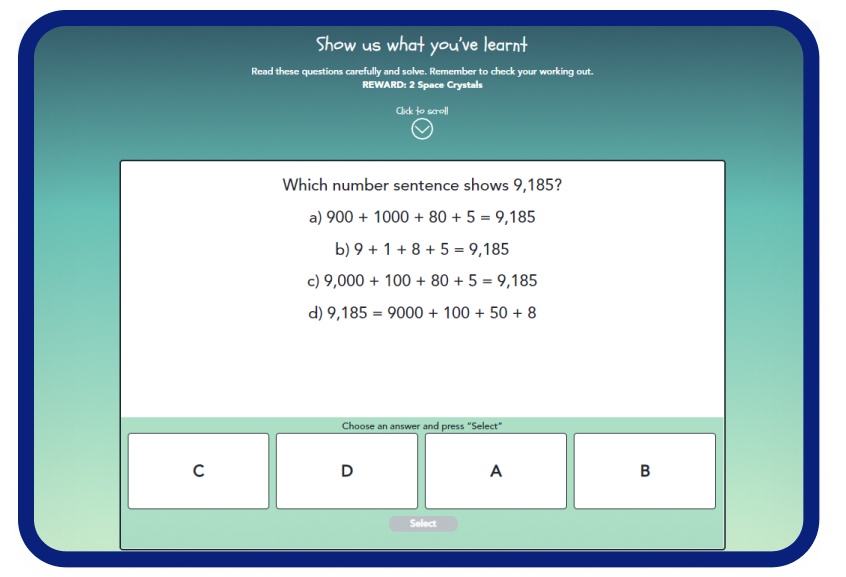
In your school: In your own teaching, you can use individual questions taken from our free diagnostic quizzes every single day to find out how well pupils are taking on what you’re teaching them. Remember that a correct answer just after the topic has been taught doesn’t necessarily mean a topic has been learned!
Online testing and technology over tutor assessment
Given that each pupil has the same tutor each week, you may wonder why we don’t make more use of tutor assessment.
There are two main benefits to using our own question bank instead:
First, an online assessment gives consistency. We have over 1,000 tutors, who all might assess slightly differently. By using these online questions we can get a more independent and objective view of where the pupils are at.
Tutors will still use their own judgment on top of our independent assessment during a lesson, as any teacher would – they might accelerate through material if they see it’s too easy, for example.
Second, an online assessment gives us data we can look at and learn from. We set ourselves a strict list of standards we expect all our tutors to meet in lessons and the data we gather from our online assessments helps us see if tutors are consistently meeting these standards.
If a lesson takes too long to complete, our numbers will show it and we’ll investigate qualitatively. Why? What’s the question pupils keep getting wrong? Is something wrong with the distractors? Is the question too wordy? Or is the question uncovering a very common misconception that we could use to inform and better improve the lessons and the teaching?
This level of actionable insight at scale just wouldn’t be possible to moderate from all our tutors.
In your school: We only have an hour a week with each pupil. It’s amazing what we can achieve in that time, but it’s not the same as the day-in day-out contact and knowledge that a class teacher has about their pupils. We are certainly not advocating you move to a purely online / paper assessment process for your own pupils; it just needs to be part of the mix together with teacher judgement.
Beyond subject knowledge: confidence and attitude
There are more things to assess than a pupils’ subject knowledge.
At Third Space, one thing we’re really excited to be working on is measuring pupil mindset and confidence.
Our schools frequently tell us that the one to one sessions make a big difference on pupils’ confidence, engagement and willingness to get involved in lessons. So, we worked hard to create a system to measure this impact. You can learn more about how we measure pupil attitude and mindset in maths.

Our latest group had their first @thirdspacetweet yr6 booster lesson on Thursday and absolutely loved it. I don’t know what it is you guys do that makes pupils adore their booster sessions, but they certainly work! (Wish they got that excited about working with me!)
— Clare Sealy (@ClareSealy) January 13, 2018
In your school: Don’t dismiss the power of Growth Mindset to transform a pupil’s confidence and results in KS2 maths. We have seen time and time again that engagement and willingness can have a big impact on whether or not a pupil secures and retains any taught knowledge.
The challenges of KS2 maths assessment
The main challenge most schools face when assessing is balancing the need for assessment with giving pupils and schools the best experience – mainly we don’t want to over-assess or take up too much time. This is something we experience as well!
We could do a really in-depth testing of pupils after every lesson, but we don’t want to exhaust pupils or make them disengage – we know pupils are already tested a lot in school… it’s a balancing act!
DO YOU HAVE STUDENTS WHO NEED MORE SUPPORT IN MATHS?
Every week Third Space Learning’s maths specialist tutors support thousands of students across hundreds of schools with weekly maths intervention programmes designed to plug gaps and boost progress.
Since 2013 these personalised one to one lessons have helped over 150,000 primary and secondary students become more confident, able mathematicians.
Learn about the diagnostic assessment or request a personalised quote for your school to speak to us about your school’s needs and how we can help.

